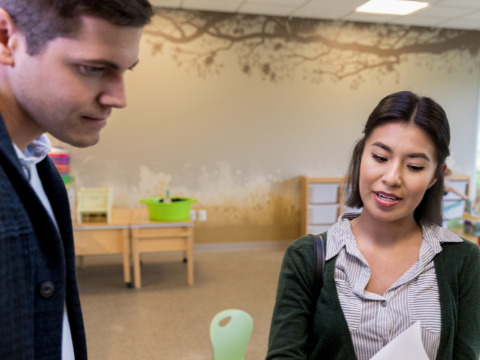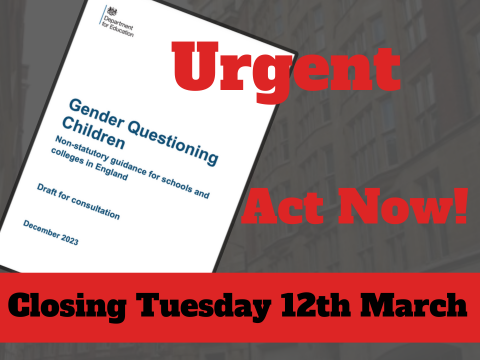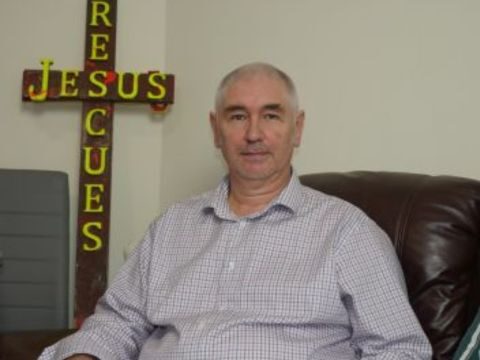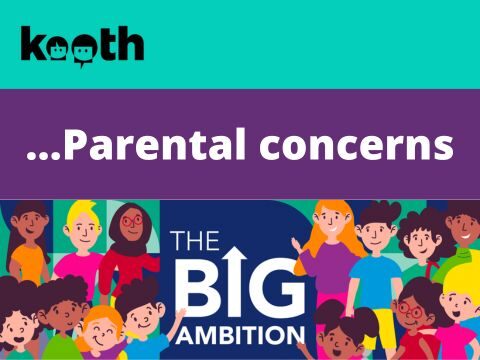

[The following account comes from a Parent Power supporter, who has shared their story of their long battle with their children’s school over its appalling RSHE programme. Their account demonstrates how the education system is currently stacked against parents who are trying to protect and do the best for their children. But we also believe that the more parents there are who are willing to make a similar stand, and follow a similar course of action, then the more effective pressure there will be for change and the restoration of parental rights over their children’s RSHE. We hope you will therefore find the following testimony both informative and inspirational.]


“Across the country, children are being subjected to lessons that are age inappropriate, extreme, sexualising and inaccurate, often using resources from unregulated organisations that are actively campaigning to undermine parents. “This is not a victory for equality. It is a catastrophe for childhood.”
This is exactly what we found at our local Church of England (CofE) primary school in Norfolk in respect of their Relationships, Sex & Health Education (RSHE) programme, which had been adopted in September 2022, without any prior parental engagement.
Alerted by recent worrisome news articles about RSHE, we made the effort to obtain and read all circa-300 pages of the school’s new RSHE teaching programme, ‘RSE Solution’, produced by Educator Solutions, a trading arm of Norfolk County Council. The school had not made it easy to inspect it, and parents were required to visit the school in the event that we wished to see the resources. The RSHE Coordinator quizzed me as to what I wanted to see, asked why, and even became defensive when I enquired if there were any aspects that included critical race theory or gender ideology.
We were shocked at what we found hidden amongst the more mainstream lesson plans, which included radical gender ideology concepts / terminology, and graphic sexual images. Within the resource 7 year old children are taught that they are only born “like a boy”, or “like a girl”, and that they need to chose their gender from options including “boy, girl, and not sure”. 8 year olds are taught that they can be “Pangender”, “Transgender” and “Cisgender” and that we live in a “Heteronormative” world. The words “Heterosexual” was not included as an option for sexual preference, nor any demographic context. The bias was stark! In one recommended lesson children are even encouraged to dress up and perform mock same-sex weddings.
We drafted a detailed letter to the Headteacher in January 2023, asking why radical gender ideology was included, and why it was being taught as fact without competing views, particularly as the Department for Education (DfE) do not require this to be taught in primary schools. We also asked why the traditional family unit was being marginalised and why the resources omitted any content about other minorities, including people with physiological or psychological impairments, for example. The response we received was very dismissive, and our request for independent evaluation of the resources was rejected on the grounds that their author had unsurprisingly deemed them to be appropriate. Our attempts to work collaboratively with the school to address the areas of contention were categorically rebuffed.
Following the school’s complaints procedure, we drafted a detailed letter to the Chair of Governors, once again setting out our concerns and our desire to collaborate. We prepared intensively for the complaint hearing that was scheduled in March 2023, by reading and referencing numerous DfE guidance and other relevant documents in our prehearing disclosure. Unfortunately, the Chair rejected much of what we wished to present, including a couple of video testimonies of those who had succumbed to radical gender ideology, explaining the irreparable harm it had caused them.
The Chair of Governors refused to postpone the complaint hearing, despite the Headteacher being too unwell to attend, and who therefore was not available to answer our questions. She also communicated at the eleventh hour that the Governors would not be considering the main basis of our complaint i.e. the contentious content of the RSHE teaching resource, and incorrectly referred us to the DfE. Not dissuaded by this obvious diversion, we presented all our substantial evidence. However, this fell on deaf ears. Most of our questions went unanswered, including whether the school’s leadership were intent on introducing ‘Drag Queen Story Time’, as was being advocated by the National Education Union. One Governor revealed his own internal bias via a very unprofessional outburst during the hearing, in which he stated that he “did not believe a word” of what I had quoted from the NSCU report, that he “shouldn’t have to listen to this”, and that it was “causing him distress”, most of which was conveniently omitted from the official meeting minutes.
Despite highlighting the substantial failings and non-compliance with both the DfE’s impartiality guidance, and legal statutes, our concerns were again summarily dismissed by the school after the complaint hearing. Therefore, acting on our behalf, Christian Legal Centre sent a detailed letter to the Headteacher setting out the substantial legal justification for our concerns and actions thus far. This too was dismissed.
Following the complaint hearing, in response to two very damning reports about RSHE provision across the whole country, the Prime Minister Rishi Sunak finally acknowledged the very real issue of inappropriate RSHE content being taught in schools (inc. contested gender ideology) and committed his Government to accelerate its review of existing RSHE guidance. The DfE have since said that they will establish clear safeguards to stop pupils from being taught contested and potentially damaging concepts as fact. Unfortunately, such commitments were still insufficient to influence the school’s leadership to rethink their stance.
Given the very biased complaint hearing, with it’s predetermined outcome, we were forced to lodge a formal complaint with the DfE by letter. However, despite sending three follow up letters, the last being in September 2023, the DfE have still even to assign a case officer and commence the investigation! A letter to our local MP promised nothing more than to pass on our concerns. Letters to several other MPs went unanswered. Ofsted were less than helpful; they claimed they could not act and instead passed our complaint back to the County Council from where the contentious RSHE teaching resources had originated! Pleas for help to the local Vicar and Army Chaplain went unacknowledged. The CofE Education Office did respond to our letters, but these were again noncommittal, passing the repsonsibility back to the school and the DfE.
Despite two press releases that were picked up by the Telegraph, the MailOnline, and GB News, the school’s leadership continued their obstinacy, refusing to collaborate or compromise. They even strategised how to deplatform me from an upcoming parental workshop where I had expected to voice my concerns with other parents present, as evidenced by electronic communiqués inadvertently copied to me in an email. Refusal to entertain my application to become a Parent Governor, where I had hoped to gain some influence, was the last straw, particularly as there were no other applicants! As such, we reluctantly made the difficult decision to transfer our two children to a different school, weighing the children’s anxieties over starting a new school and disrupting their friendships against the need to safeguard them from this damaging RSHE teaching.
Our story does not end with the change of school. We will continue to pursue the Df, calling on them urgently to review the RSHE resources produced by Norfolk County Council’s Educator Solutions. This resources is now widely used throughout the county and beyond, meaning hundreds, if not thousands, of children are being exposed to this safeguarding risk. We want to continue to share our story in the hope that it will inspire other parents to act to safeguard their own children. With sufficient support from other parents, perhaps we can even win back our parental right of withdrawal from RSHE.
Supplementary information on Norfolk County Council’s RSE Solution programme:
The following is a list of the main concerns raised about aspects of the RSHE teaching materials in use at the school, all of which were inadequately responded to, and / or dismissed by the Headteacher and the Governing Board. The teaching materials come from the RSE Solution Resource, produced by Educator Solutions / Norfolk County Council:
- Year 3, page 71. Children are taught that gender describes “how much you feel like a boy, or a girl.” Firstly, this topic is age inappropriate, and is likely to cause 7 year old children substantial confusion. Secondly, the Rt Hon Suella Bravermen QC MP (referred to hereafter as ‘SB’) points out in her keynote speech, delivered at the Policy Exchange in August last year, that the assertion there is a distinction between “gender” and “sex” is a contested topic, and is both partisan and political in nature. DfE guidance published in February 2022 (referred to hereafter as ‘DfE guidance’) states that where partisan political views are covered that these must be presented in the appropriate context, which supports a balanced presentation of opposing views. Only one definition of gender is presented here, and the lack of alternatives is therefore evidence that this requirement is not being met.
- Year 3, page 72. Children are taught that “some people are born like a boy (with a penis), but feel like a girl inside or born like a girl (with a vulva) but feel like a boy inside.” Firstly, people are not born “like” a boy, or born “like” a girl. This is a very disturbing and confusing phrase to use. As eminent UK Scientist Professor Winston has often vocalised in mainstream media, one’s sex (genitalia / gametes / chromosomes) is immutable, irrespective of how people may come to feel inside as they develop. Secondly, as for point 1 above, this topic is very inappropriate to introduce to 7 year old children, and its delivery in the manner prescribed is again imbalanced and partisan. No attempt is made to consider the multitude of other mental conditions or growing pains that do contribute to gender confusion, nor to point out that 80-90% of adolescents grow out of this. Thirdly, no real world context is provided. What proportion of people feel this way? Context is totally absent. Why?
- Year 3, pages 71 – 75. Children are encouraged to learn about, and challenge, certain stereotypes. Challenging and debating stereotypes can be valid, but this should be balanced and appropriate. With that in mind, what do the teaching materials hope to achieve by teaching young boys to question whether it is “fair for them not to be allowed to wear skirts/dresses”, particularly when school policy would not allow this anyway? Furthermore, only the perceived negative side of the stereotype debate is presented in the teaching materials, but not the other side of the equation. What about respecting traditions and customs? Teaching boys chivalry, respect, and good manners, though some may feel outmoded, is sorely needed, and may go some way toward reducing violence against women. Some traditions are worthy of retention in a modern world. Why present such a one-sided interpretation of stereotypes?
- Year 4, page 121. Children are asked “to think about what gender they are”, and 3 options are provided – boy, girl, and not sure. Firstly we would draw reference to points 1 and 2 above, and thus question the age appropriateness and impartiality of such an exercise, particularly when little attempt is made to explore and emphasize other well-known expressions, such as being a ‘Tomboy’. Secondly, as SB confirmed in her speech in reference to the DfE guidance, schools do not need to set exercises that relate to children self-identifying their gender. Why then have the school elected to do so? Thirdly, we feel that this activity could lead some children to become very confused and anxious, potentially damaging their mental health, and with lasting repercussions. Fourthly, we are advised that this exercise itself could be deemed a Safeguarding concern. The DfE guidance to schools planning their RSHE content is clear, and I quote:
“You should not reinforce harmful stereotypes, for instance by suggesting that children might be a different gender based on their personality and interests or the clothes they prefer to wear. Resources used in teaching about this topic must always be age-appropriate and evidence based. Materials which suggest that non-conformity to gender stereotypes should be seen as synonymous with having a different gender identity should not be used and you should not work with external agencies or organisations that produce such material. While teachers should not suggest to a child that their non-compliance with gender stereotypes means that either their personality or their body is wrong and in need of changing, teachers should always seek to treat individual students with sympathy and support.”
- Year 4, page 126. Children are asked to “volunteer to come to the front of the class and pretend to get married”, and told that “they can be the same or different gender to each other”. Use of symbolic clothing or props is also encouraged to “help the class to get into the occasion”, with participants being required to read out the vows. Firstly, this is another inappropriate activity for 8 year old children. Secondly, where in the links and documents the school provided is it stated that this activity is necessary, and on what grounds? Children of this age cannot possibly comprehend the responsibility, obligations, and commitments entailed in marriage. If it is deemed necessary, then how will you ensure the customs of other cultures are equally catered for? Furthermore, many loving couples choose not to get married, so would such an activity alienate those children whose parents are not married? What then is the learning outcome?
- Year 5, pages 171 – 181. Children are required to learn about several terms including ‘Transgender’ and ‘Intersex’. Firstly, SB confirmed in her speech that in her professional and learned view, schools teaching such keywords to such young children would be falling foul of central Government guidance. On what basis has the school formed a different view? Do children really need to know about such terms? Secondly, the terms ‘Heterosexual’ and or ‘Straight’ are missing from the same list that contains the terms ‘Gay’ and ‘Lesbian’. Why is this? Is this balanced? Have the children been taught the former terms before, and if so, surely a reminder would be appropriate? Thirdly, again, no real world context is provided. Would it not be prudent to illustrate the population demographic of such groups in society?
- Year 6, page 211 – 221. Firstly, the pictures used to demonstrate sexual intercourse are quite graphic, and will be more so when printed on A4 or larger format and distributed around the classroom. I personally recall receiving such visual instruction at secondary school, when I was 13 years old, and certainly not at 9/10 years old. Secondly, of significant concern is the effective reference to pre-coital foreplay, involving each partner touching their partner’s respective genitalia. This is totally unnecessary information and age inappropriate. Thirdly, in teaching sexual reproduction it is not necessary to mention that adults can also have sexual intercourse for pleasure.
- Year 6, pages 224 – 238. Following on from point 6 above, children are required to learn about additional terms including ‘Cisgender’ and ‘Pangender’. Firstly, and as before, SB confirmed in her speech that in her professional and learned view, schools teaching such keywords to such young children would be falling foul of central Government guidance. On what basis has the school formed a different view? Secondly, and as before, the terms ‘Heterosexual’ and or ‘Straight’ are omitted from the list. Why is this? Is this balanced? It seems odd to omit such terms, but include, new and or hitherto uncommonly employed terms such as ‘Cisgender’ and ‘Heteronormativity’, which themselves are very much part of the contested dogma as referred to by SB in her recent speech.
- Year 6, pages 240 – 247, 250 – 251, 253, 255 – 256 are all missing. Page 254 is blank. Why is this?
- Year 4 onwards. Of particular note is the woeful lack of diversity throughout the teaching materials in regards large sections of our community including, but not limited to, people with disabilities, whom are suffering mental health illnesses (such as body dysmorphia, or bulimia, ADHD, and Autism), whom are disfigured, whom have invasive physiological illnesses (such as Crohn’s disease), and whom have learning disabilities (such as for people with Downs Syndrome). Why is this? Surely, when teaching about diversity it is just as necessary to build children’s awareness of such people, and thus extend the goals of inclusion, tolerance and respect to them as well as those other minorities that are evidently included in the current teaching materials?
Two examples of the pages from the RSHE teaching resource –
Article written by ParentPower Supporter






